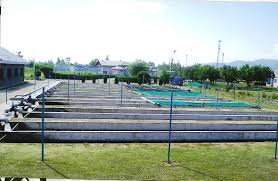Dr. Mansoor Rather
 Kashmir being bestowed with the richest water resources with huge fisheries potential is now highly dependent on outside state fish supply to meet the market demands.
Kashmir being bestowed with the richest water resources with huge fisheries potential is now highly dependent on outside state fish supply to meet the market demands.
The small village and field springs (locally known as Naag) which once used to be the main source of drinking water all over Kashmir with a huge aesthetic and spiritual value also inhabited a number of fish varieties has almost vanished now.
The traditional fisherman community remains the worst hit, due to the fast dwindling of this highly valuable natural resource, stories of catching hundreds of kilos of fish in the near past with a little effort seem just like fairy tale now. Not only are we losing a valuable natural resource at such a fast rate, but we are also marching towards an environmental disaster and an economic holocaust to our fishing community as well.
Fish is considered to be one of the cheapest sources of the best quality protein; the flesh of fish contains many readily available amino acids, such as lysine, methionine and tryptophan, in quantities comparable to those in eggs, meat, and milk.
Their unsaturated fats, vitamins, minerals, and trace elements are important to the human diet. Fish is considered to be almost as beneficial to the body as mother’s milk.
Unfortunately, fisheries in Kashmir have never witnessed any love and care from anyone, except when it is ready as a delicious diet. What is more dangerous about our valuable fish resources and the community; is that the serious decline in the local fish production has gone unnoticed, owing to the huge influx of outside state fish into the local market.
With the culture fisheries still in its nascent stage in Kashmir, the local fish supply heavily depends on the fishes caught by the traditional fishers, who are solely dependent on fish for their livelihood. With the fish catch severely reduced, fishing no longer remains a profitable venture anymore. It has left the fishing community distressed and the profession is dwindling faster. The younger generation is also not willing to take up the profession anymore. Sport fishing and angling along with the unique hill fisheries of Kashmir, which once used to be one of tourist attractions and added to the economy is also declining.
Water bodies are too heavily chocked to expect any huge fish production, the reasons for such state of affairs are many, human beings are the main reason. Over last few decades, ecosystems have suffered from intense human intervention resulting in habitat loss and degradation and as a consequence, many fish species have perished or declined.
The wild fisheries and its resources are declining due to factors such as human interventions to the natural habitat, encroachment of rivers, lakes and other water bodies, environment degradation through pollution, diversion of water for various purposes, overexploitation and many other factors.
Kashmir is slowly turning a into a begging bowl for fishes, we have to look to outside state fish supply to satisfy our market demand which not only gives a jolt state’s economy but has hit the jobs of the local fishermen as well. Because of the availability of outside state fish supply the local fish markets have declined. It has rendered a large number of economically backward fishing community jobless and they are compelled to shift to unsustainable job practices like sand dredging and illegal fishing practices, which are posing threat to the already fragile aquatic environment.
Comprehensive schemes for fish biodiversity conservation and safeguard of aquatic environment are mandatory to prevent its further degradation. Law enforcement has been the greatest tragedy in the past few decades in the turmoil hit valley; time has come to strictly implement fisheries laws and legislations and other environment laws. Other conservation strategies, which are very successful in various states of India, like demarcation of some areas as “No Fishing Zones” and identifying areas as “Fish Sanctuaries” where fishing may be completely banned so that they serve as fish reservoirs to boost the depleting resources.
While devising any strategy, the fishing community needs to be an integral part of any such programme. Moreover, exhaustive awareness campaigns need to be launched to sensitise the people regarding the importance and delicacy of these underwater creatures and their importance to the ecosystem.
Along with this, the concerned government departments; scientists, scholars and the civil society need to come forward and take immediate and adequate steps to address the crucial issue of unprecedented loss to aquatic biodiversity and habitat.
In order to preserve these highly vulnerable areas and species for future generations, immediate action in the form of aquatic biodiversity conservation strategies are necessary. In general, aquatic conservation strategies should support sustainable development by protecting biological resources in ways that will preserve habitats and ecosystems.
Author can be mailed at mansooraqua@gmail.com





